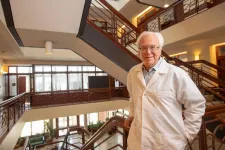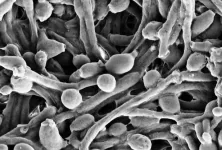Scientists identify new gut-liver drug recycling process
Implications for developing treatments for intestinal diseases
2021-07-14
(Press-News.org) A team of University of Houston pharmaceutical researchers is reporting a newly recognized process of drug metabolism in the intestines - followed by recycling through the liver - that could have important implications for developing treatments for intestinal diseases and for taking multiple medications at the same time.
"The intestines play a crucial role in metabolizing and recycling certain plant compounds and drugs," reports Ming Hu, Diana S-L. Chow Endowed Professor of Drug Discovery and Development and the senior author of the paper in eLife. "The discovery has important implications for scientists trying to understand how both phytochemicals (a type of plant compound, such as flavonoids) and medicines are metabolized in the body."
The new information could help chemists develop better drugs and clinicians to fine-tune medication dosing, especially when dealing with polypharmacy, where a patient takes multiple drugs at the same time.
Scientists have long recognized that bile acid is produced in the liver and released into the intestines and is then recycled back through the liver for reuse as the bile. Some medications that are metabolized in the liver also go through this process, known as enterohepatic recycling (EHR). This can extend the life of drugs in the body, which may affect how well they work and whether they cause side effects.
"The liver has long been considered the most important organ for drug metabolism," said lead author Yifan Tu, who conducted the study while he was doing his doctoral work at the UH College of Pharmacy. "But we've shown that the intestines also play a major role in drug metabolism."
In their experiments, the team administered 16 different types of flavonoids or drugs directly to the liver or intestines and then tracked what happened to the treatments. They found that some drugs and compounds were metabolized in the intestines and the metabolites were then transported to the liver before being cycled back into the intestines.
"In this process, the liver acts only as a recycling organ, which is rare, since the liver is known to be the metabolic 'superstar' organ in humans," said Tu, who is now a postdoctoral fellow at the pharmaceutical company Boehringer Ingelheim in Connecticut.
The team has called this new mechanism 'hepatic enteric recycling' (HER). They found that, in this process, the roles of the liver and intestines are reversed. "This may explain why some drugs or plant compounds have larger effects on the intestine than anticipated and could help scientists understand how intestinal diseases may alter drug metabolism in the body," said Tu.
"We hope our findings will be useful for medicinal chemists to design new drugs tailored to treat intestinal, especially colonic diseases," said Hu.
INFORMATION:
[Attachments] See images for this press release:

ELSE PRESS RELEASES FROM THIS DATE:
2021-07-14
A new study led by the U.S. Geological Survey outlines a means to better estimate COVID-19 occurrence and trends in populations.
Currently, COVID-19 testing is primarily limited to self-selected individuals, many of whom are symptomatic or have had contact with someone who is symptomatic. While these tests are useful for individual medical treatment and contact tracing, they do not provide health officials with a complete picture of the disease across the population.
"Coordinated sampling of COVID-19 is key to informing health officials as they continue their efforts to control the pandemic, permitting better predictions of disease dynamics and ...
2021-07-14
Antibiotic exposure early in life could alter human brain development in areas responsible for cognitive and emotional functions, according to a Rutgers researcher.
The laboratory study, published in the journal iScience, suggests that penicillin changes the microbiome - the trillions of beneficial microorganisms that live in and on our bodies - as well as gene expression, which allows cells to respond to its changing environment, in key areas of the developing brain. The findings suggest reducing widespread antibiotic use or using alternatives when possible to prevent neurodevelopment problems.
Penicillin and related medicines (like ampicillin and amoxicillin) are the most widely used antibiotics in ...
2021-07-14
Scientists at Northwestern University in Evanston, Illinois have developed a hydrogel integrated with zirconium-based robust metal-organic frameworks (MOFs) that rapidly degrades organophosphate-based nerve agents used in chemical warfare. Unlike existing powdered MOF adsorbents, this hydrogel composite does not require added water and may be easily scaled up for use in protective masks or clothing. The work appears July 14 in the journal Chem Catalysis.
"Organophosphate-based nerve agents are among the most toxic chemicals known to humanity," says senior author Omar Farha, a professor of chemistry at Northwestern University. "Their use in recent global conflicts reflects the urgent need for personal protective gear, as well as the bulk destruction of ...
2021-07-14
(Salt Lake City) - Bacteria's role in gut health has received a lot of attention in recent years. But new research led by scientists at END ...
2021-07-14
BOSTON - New research in humans and mice identifies a particular signaling molecule that can help modify inflammation and the immune system to protect against Alzheimer's disease. The work, which was led by investigators at Massachusetts General Hospital (MGH), is published in Nature.
Cognitive decline associated with Alzheimer's disease develops when neurons begin to die. "Neuron death can be caused by improper immune responses and excessive neuroinflammation--or inflammation in the brain--triggered by high levels of amyloid beta deposits and tau tangles, two hallmarks of Alzheimer's disease," explains the paper's co-senior author Filip Swirski, PhD, who conducted the work while a principal investigator in the Center for Systems Biology at MGH. ...
2021-07-14
BOSTON - Over the last decade, investigators at Beth Israel Deaconess Medical Center (BIDMC) have been at the forefront of the effort to END ...
2021-07-14
New York, NY--July 14, 2021-- A previously unknown kind of human brain cell appears to help people center themselves in their personal maps of the world, according to a new study from neuroscientists at Columbia Engineering. This discovery sheds light on the cellular mechanisms underlying navigation and memory in humans, as well as what parts of the brain might get disrupted during the kinds of memory impairments common in neurodegenerative diseases such as Alzheimer's.
There are two strategies with which humans and animals navigate and orient themselves. One involves locating places, distances and directions in "allocentric" or other-centered ...
2021-07-14
What The Study Did: The COVID-19 pandemic was associated with a decline in addiction treatment initiations but more research is needed to understand the cause of the decline in initiations and the extent to which it was due to reduced demand for services or reduced ability to supply treatment.
Authors: Tami L. Mark, Ph.D., M.B.A., of RTI International in Rockville, Maryland, is the corresponding author.
To access the embargoed study: Visit our For The Media website at this link https://media.jamanetwork.com/
(doi:10.1001/jamanetworkopen.2021.17029)
Editor's Note: The article ...
2021-07-14
What The Study Did: In this randomized clinical trial, a physician messaging campaign was effective in increasing COVID-19 knowledge, information-seeking and self-reported protective behaviors among diverse groups.
Authors: Esther Duflo, Ph.D., of the Massachusetts Institute of Technology in Cambridge, is the corresponding author.
To access the embargoed study: Visit our For The Media website at this link https://media.jamanetwork.com/
(doi:10.1001/jamanetworkopen.2021.17115)
Editor's Note: The article includes conflict of interest and funding/support disclosures. Please see the article for additional information, including other authors, author contributions and affiliations, conflict of interest and financial disclosures, and funding and support.
# # ...
2021-07-14
What The Study Did: About half the women experiencing homelessness and unstable housing who were surveyed experienced symptoms of depression or anxiety or both during the pandemic and, in addition to unmet subsistence needs and social isolation, these symptoms were associated with increased challenges accessing non-COVID-19 care and managing symptoms for chronic medical conditions.
Authors: Elise D. Riley, Ph.D., M.P.H., of the University of California, San Francisco, is the corresponding author.
To access the embargoed study: Visit our For The Media website at this link https://media.jamanetwork.com/
(doi:10.1001/jamanetworkopen.2021.17035)
Editor's ...
LAST 30 PRESS RELEASES:
[Press-News.org] Scientists identify new gut-liver drug recycling process
Implications for developing treatments for intestinal diseases


